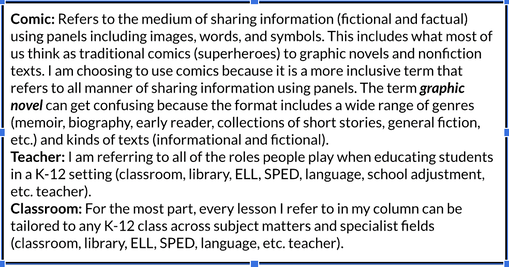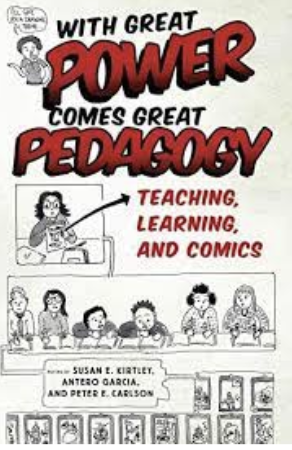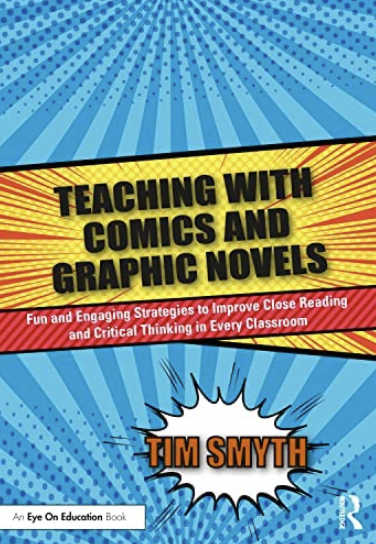The second book, Tim Smyth’s Teaching with Comics and Graphic Novels: Fun and Engaging Strategies to Improve Close Reading and Critical Thinking in Every Classroom is a much more down-to-earth, how-to guide to using comics in the classroom. I devoured this book! Tim Smyth has a long and impressive CV: he teaches 10th and 11th grade United States and modern History Wissahickon High School in Ambler, Pennsylvania, and he has been part of a global Comics in Education program developed online through the US State Department. He shares his many resources on his website TeachingWithComics.com. The chapters move from “How to Teach Comics,” to “Some Quick and Easy Lessons for Any Classroom” to “Tough Topics,” “Civil Rights,” “Refugees and Immigration” to “Social Emotional Learning and Graphic Memoirs.” Smyth offers a wide range of concrete lessons you can use to incorporate comics in your library classroom or that you can encourage the teachers in your school to use in their classrooms. A few examples include:
- Sequencing and Personal Interpretation. The idea behind this lesson is that there isn’t always one way to interpret a story, but we have to use evidence to support why we think one way or another about a story (and by extension a work or art, music, image, etc.) Smyth uses a wordless one-page comic that depicts a boy frolicking in leaves that he has been raking for this lesson. Smyth laminates the comic, cuts up each panel, and applies velcro to the back. He asks students to analyze the images and place them in the order they think best tells the story. From there, students compare their versions to the original. Extensions to this lesson include writing dialogue, writing out the story, reordering the images to tell a different story. (Ch. 7, pg 43-46).
- Fairy Tales in Comics. The steps to this lesson are as follows: Read Different Versions of Fairy Tales including comic versions. Ask questions about the similarities and differences. Create your own version of a fairy tale in comic form, and you can require that it must be a moral tale, or have a minimum number of panels, or include fantastical elements (Ch. 14, pg 95-99).
- Social Emotional Learning. Smyth writes, “Sometimes having a diverse collection of books in the classroom and the library can be enough to literally save children’s lives as they feel seen and accepted… There are many titles that can open up vital conversation in ways that might not otherwise be possible”(140). He offers many suggestions both in his book and on his website regarding books that can be used to discuss social and emotional topics (Ch. 18, pg 140-148).
Please share your own lessons that are successful with me. I’d love to gather a list for other teachers. I am also interested in what more you want to learn about teaching with comics. In the next issue of the forum I plan to talk about choosing graphic biographies. Let me know if you have other topics you’d like me to cover.




